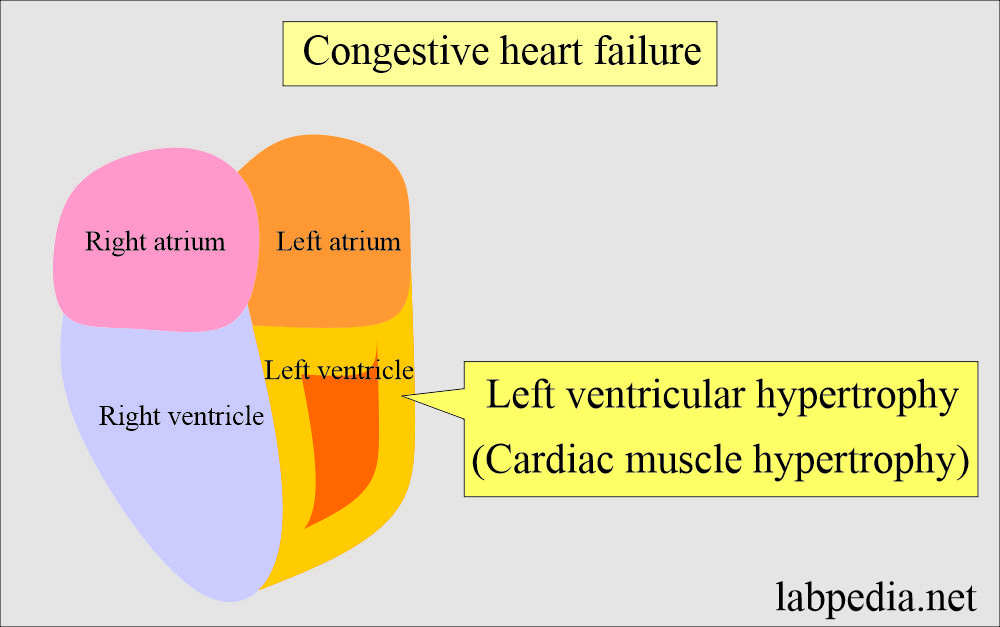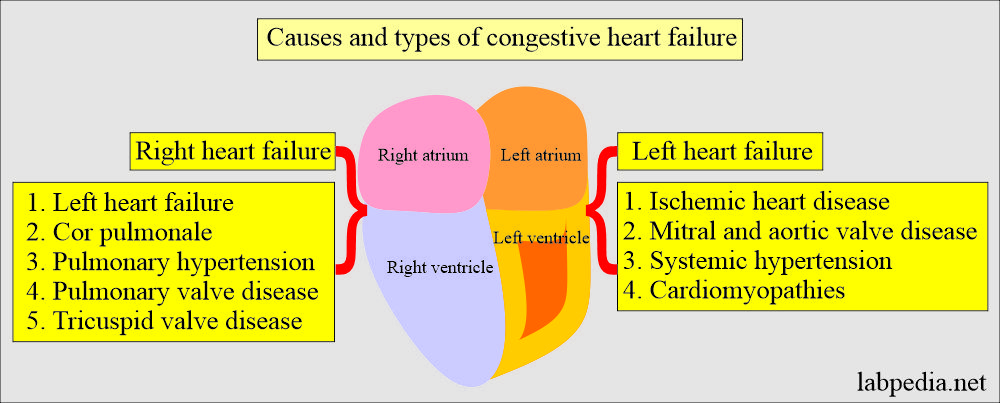Congestive Heart Failure, Lab Work up
Congestive Heart Failure
Definition of congestive heart failure
- Heart failure is also called congestive heart failure.
- This congestive heart failure (biventricular) is used in various conditions, but the best is to restrict this terminology to right heart failure resulting from pre-existing left heart failure.
- Biventricular cardiac failure is the most common manifestation of heart failure and can be divided into:
- Left cardiac failure.
- Right cardiac failure.
- Heart failure may be:
- Compensated type. The symptoms are stable, and obvious features of fluid retention are absent.
- Decompensated type. It is acute or continuing deterioration of heart failure.
- Congestive heart failure is due to damage to the cardiac muscles.
- In this condition, the heart cannot pump the blood at the rate needed by the body for the metabolism of the tissues.
Pathophysiology of Congestive Heart Failure
- The heart failure may be due to:
- Coronary artery disease (CAD). If the coronary arteries become blocked or severely narrowed, the heart becomes starved of oxygen and nutrients.
- The heart attack damages the heart muscle, resulting in a scarred area that does not function properly.
- Cardiomyopathy. Damage to the heart muscle causes other than artery or blood flow problems, such as infections or alcohol or drug abuse.
- High blood pressure leads to overwork of the heart.
- Other diseases like valvular diseases, thyroid disease, kidney disease, diabetes, or heart defects present at birth can all cause heart failure.
- Heart failure can occur when several diseases or conditions are present at once.
- Coronary artery disease (CAD). If the coronary arteries become blocked or severely narrowed, the heart becomes starved of oxygen and nutrients.
- In many pathologic conditions, the onset of heart failure is preceded by cardiac hypertrophy, which is the compensatory response of the heart.
Clinical presentation of heart failure:
Left heart failure:
- Ischemic disease is the most common cause.
- There is systemic hypertension, chronic or malignant.
- There may be aortic or mitral valve diseases.
- There may be cardiomyopathy.
Right heart failure:
- This syndrome is seen in various conditions.
- It is seen in left heart failure.
- This may be due to chronic lung disease (cor pulmonale).
- The patient may have tricuspid valve disease.
- There may be pulmonary valve disease.
- There may be isolated right ventricular cardiomyopathy.
- There may be atrial or ventricular septal defects.
- There may be mitral valve disease with pulmonary hypertension.
- Congestive heart failure is the most common cause of transudative pleural effusion.
- In treated cases, transudate may change into exudate.
- Effusion due to congestive heart failure is more on the right side.
Classification of congestive heart failure:
Heart failure, according to the American College of Cardiology and American Heart Association, is divided into four stages:
Stage A:
- These patients in stage A are those groups with the following illness and risk of developing heart failure but have no sign or symptom of failure.
- Patients with diabetes.
- With H/O blood pressure.
- Patient with H/O coronary disease.
- Patient with metabolic syndrome.
- Excessive use of alcohol.
- With H/o cardiac toxic drug therapy.
- H/O rheumatic fever.
- Patients with family H/O of cardiomyopathy.
Stage B:
- These patients have heart disease but no symptoms.
- Patients with H/O heart attack.
- Patient with low ejection fraction.
- Valvular diseases without symptoms.
Stage C:
- This group has heart disease and symptoms.
- These patients have shortness of breath.
- Decreased stamina or decreased ability for exercise.
- Easy fatigability.
Stage D:
- This group has advanced heart disease and needs aggressive medical treatment.
- These patients have systolic heart failure and all signs and symptoms of heart failure.
Workup of the patient with heart failure:
- Electrocardiogram (ECG).
- X-Ray chest.
- Blood test for:
- Electrolytes, Na. K, Mg.
- Cardiac enzymes.
- Thyroid function test.
- Kidney function test.
- Stress test.
- MRI
- Cardiac catheterization or angiography.
Lab findings in heart failure:
| Serum | |
| Sodium | Normal or decreased |
| Potassium | Normal |
| Bicarbonate | Normal |
| Chloride | Decreased |
| Volume | Increased |
| Urine | |
| Sodium | Decreased |
| Potassium | Normal |
| pH | Normal |
| Volume | Decreased |
What is the treatment of Congestive heart failure:
- To prevent heart failure, advise the patient:
- Stop smoking.
- Stop alcohol intake.
- Stop the use of harmful drugs (drug abuse).
- Treat hypertension.
- Treat hypercholesterolemia.
- Give adequate treatment after AMI.
- Treatment of chronic heart failure target:
- Relieve the symptoms.
- Bed rest is helpful in the early days of congestive heart failure.
- Diuretics reduce the load on the heart.
- Bed rest may lead to deep vein thrombosis, so put the patient on heparin and give elastic stockings.
- Slowly start exercises for 20 to 30 minutes, walking 2 to 3 times weekly.
- Can start cycling for 20 minutes at 70% to 80% of peak heart rate five times per week.
- modify the diet.
Questions and answers:
Question 1: What is the classification by the American College of Cardiology?
Question 2: What is saerum K+ and serum Na+ in heart failure?


